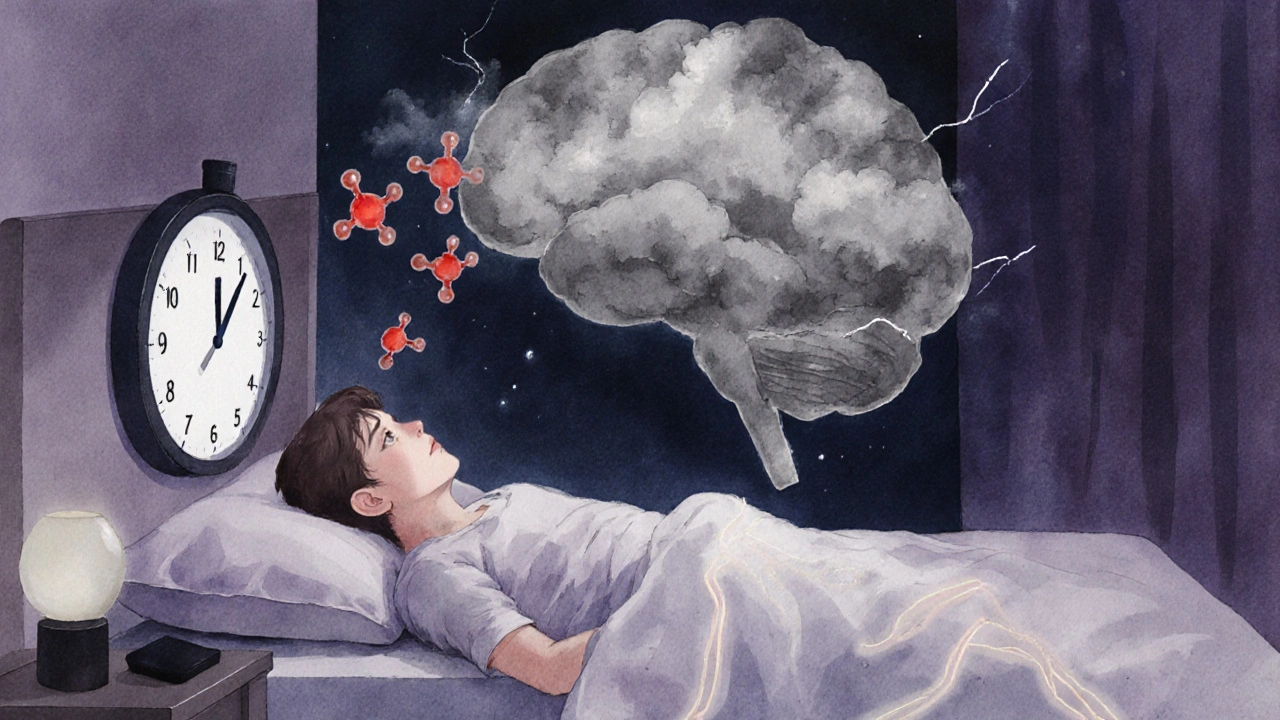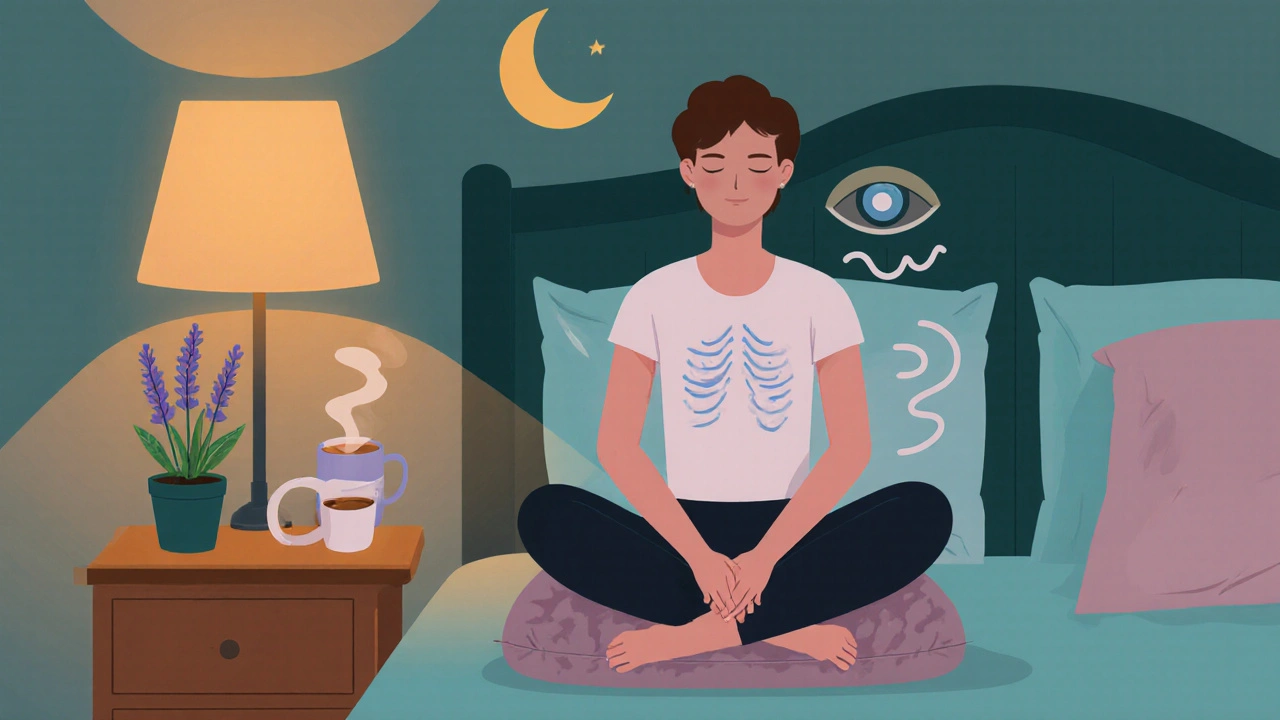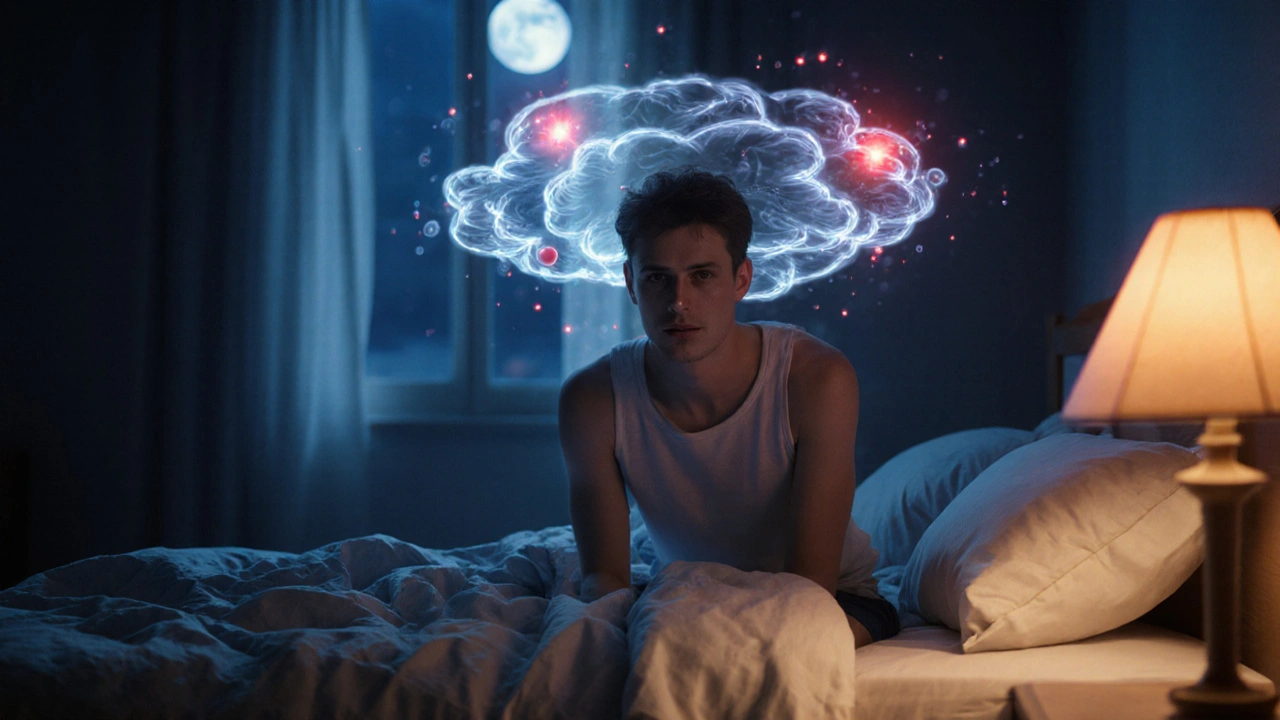When anxiety and sleep disorders show up together, it feels like a vicious loop - racing thoughts keep you up, and sleepless nights make those thoughts louder. Understanding why this happens and how to break the cycle can turn restless nights into restful ones.
What Is Anxiety?
Anxiety is a mental‑health condition characterized by excessive worry, tension, and physical symptoms such as a racing heart, muscle tightness, and intrusive thoughts. It affects roughly 1 in 7 adults worldwide and can flare up in response to stress, trauma, or even everyday pressures.
What Counts as a Sleep Disorder?
Sleep disorder is any condition that disrupts the normal sleep‑wake cycle, leading to insufficient, poor‑quality, or non‑restorative sleep. Common types include insomnia, sleep apnea, restless‑leg syndrome, and circadian‑rhythm disorders.
How Anxiety Messes With Your Sleep
The brain’s alarm system and the body’s relaxation system normally balance each other. Anxiety tips the scale toward the alarm side in three main ways:
- Hyper‑arousal: Elevated cortisol and adrenaline keep the nervous system on high alert, making it hard to wind down.
- Thought overflow: Worries flood the mind, creating a mental “playlist” that prevents the brain from entering the slow‑wave stages needed for deep sleep.
- Physiological feedback: Rapid breathing and muscle tension increase heart rate, which the body interprets as a signal that sleep isn’t safe.
These mechanisms are backed by research from the 2023 International Journal of Psychiatry, which found that people with chronic anxiety have 30% higher evening cortisol levels than non‑anxious peers.
Sleep Disorders Most Tied to Anxiety
Not every sleep problem is driven by anxiety, but a handful show a strong overlap.
- Insomnia - difficulty falling or staying asleep. Up to 60% of chronic insomnia sufferers also meet criteria for an anxiety disorder.
- Sleep apnea - repeated airway blockages that cause brief awakenings. Anxiety can worsen the perception of breathlessness, leading to fragmented sleep.
- Restless‑leg syndrome (RLS) - uncomfortable leg sensations that force movement. Stress hormones amplify the urge to move, making RLS flare during anxious periods.

Comparison: Insomnia vs. Sleep Apnea
| Feature | Insomnia | Sleep Apnea |
|---|---|---|
| Typical Symptoms | Difficulty falling asleep, waking up early, feeling unrefreshed | Snoring, gasping pauses, daytime fatigue |
| Link to Anxiety | High - anxiety often triggers the onset | Moderate - anxiety can heighten perception of breathlessness |
| Primary Cause | Hyper‑arousal, rumination, hormonal imbalance | Physical airway obstruction during sleep |
| Treatment Focus | CBT‑I, relaxation, sleep hygiene | CPAP devices, weight management, positional therapy |
The Vicious Cycle: Why One Worsens the Other
When anxiety keeps you up, the body misses out on REM and deep‑sleep phases that normally lower cortisol and reset mood. Without those restorative phases, the next day’s anxiety spikes, and the cycle repeats. This feedback loop can become chronic within weeks, especially if you ignore early signs.
Practical Ways to Break the Cycle
Below are evidence‑based steps that target both the mind and the body.
- Mindful Wind‑Down Routine - Spend 15‑20 minutes before bed doing slow breathing, progressive muscle relaxation, or a guided body scan. Studies from Stanford 2022 show a 40% reduction in sleep latency when participants practiced a nightly 5‑minute mindfulness cue.
- Limit Stimulants After Mid‑Afternoon - Caffeine, nicotine, and even high‑sugar snacks keep cortisol high. Switch to herbal tea or water after 3p.m.
- Regulate Light Exposure - Melatonin is a hormone that signals the brain it’s night time. Dim lights an hour before sleep and avoid screens; blue‑light filters can help preserve natural melatonin production.
- Physical Activity Earlier in the Day - A 30‑minute brisk walk or strength session boosts endorphins and reduces anxiety. Avoid vigorous exercise within two hours of bedtime, as it may raise heart rate.
- Cognitive Behavioral Therapy for Insomnia (CBT‑I) - This structured program tackles the thoughts and behaviors that keep you awake. A 2021 meta‑analysis found CBT‑I improves sleep efficiency by 15% and simultaneously lowers anxiety scores.
- Consider Professional Help - If anxiety feels unmanageable, a psychiatrist can assess whether medication (e.g., SSRIs, short‑term sleep‑aids) is appropriate.

Quick Checklist to Spot When Anxiety Is Driving Your Sleep Problems
- Waking up with a racing mind at least three nights a week?
- Rising cortisol levels (e.g., trouble staying calm in the evening)?
- Using alcohol or over‑the‑counter sleep aids regularly?
- Feeling more irritable, foggy, or anxious after a poor night’s sleep?
If you checked off two or more, it’s time to try the steps above or book a consultation.
When to Seek Professional Help
Self‑help works for many, but certain red flags call for a clinician:
- Sleep lasting less than four hours on most nights for >3weeks.
- Sudden panic attacks, thoughts of self‑harm, or severe mood swings.
- Physical symptoms like chronic headaches, gastrointestinal upset, or unexplained weight loss.
- Evidence of a sleep‑related breathing disorder (loud snoring, choking sensations).
A mental‑health professional can run a brief screening, possibly order a sleep study, and tailor a treatment plan that blends therapy, lifestyle tweaks, and medication if needed.
Bottom Line
Anxiety and sleep disorders are tightly linked through hormones, brain activity, and daily habits. By addressing the root causes-stress management, sleep hygiene, and targeted therapies-you can disrupt the loop and reclaim both calm nights and clear days.
Frequently Asked Questions
Can anxiety cause sleep apnea?
Anxiety doesn’t directly block the airway, but it can worsen the perception of breathing difficulty and make apnea events feel more disturbing, leading to fragmented sleep.
What’s the fastest way to lower nighttime cortisol?
A short 5‑minute breathing exercise (4 seconds in, 6 seconds out) combined with dim lighting reduces cortisol within 20 minutes for most people.
Is CBT‑I better than sleeping pills?
CBT‑I addresses the underlying thoughts that keep you awake and has lasting benefits, while prescription sleep aids only offer short‑term relief and can cause dependency.
How many hours of sleep do I need to keep anxiety in check?
Most adults feel a noticeable drop in anxiety when they consistently get 7‑9 hours of quality sleep. Quality matters more than quantity; uninterrupted deep sleep is key.
Can melatonin supplements replace good sleep hygiene?
Melatonin can help reset the body’s clock, but it won’t fix anxiety‑driven arousal. Use it alongside relaxation techniques and habit changes for best results.







Rohit Poroli
It’s absolutely understandable how the neuroendocrine cascade you described can lock you into a hyper‑arousal state. The sympathetic nervous system pumps cortisol and epinephrine, which in turn raises heart rate and sustains vigilance, making the transition to NREM sleep almost impossible. You might consider integrating progressive muscle relaxation, which targets the somatic facet of anxiety by actively diminishing tonic muscle activity. Additionally, a brief session of diaphragmatic breathing can modulate the hypothalamic‑pituitary‑adrenal axis, thereby lowering evening cortisol spikes. Keep tracking your sleep latency in a journal; the data will help you fine‑tune behavioral interventions while keeping you motivated.
William Goodwin
🌙 The intertwining of anxiety and sleep is like a dark ballet where each partner refuses to let the other rest. You see, anxiety activates the amygdala, the brain’s alarm system, which floods the body with norepinephrine. This chemical cocktail tells every cell, “Stay alert!” while your circadian rhythm whispers, “It’s night, calm down.” The result is a classic case of physiological dissonance-your internal clock and stress response are out of sync, and the body simply cannot reconcile the two.🤯
Imagine your mind as a radio that never finds the right frequency; it just keeps switching stations, each louder than the last. That’s why the mental “playlist” you mentioned feels endless. CBT‑I, the gold standard for insomnia, works by rewiring those thought patterns, essentially teaching the brain to switch to a soothing channel. Meanwhile, mindfulness meditation acts as a mute button on the amygdala, lowering the baseline anxiety level over weeks.
Another key factor is light exposure. Blue‑light wavelengths suppress melatonin production, which is the hormone that signals the pineal gland to ease you into sleep. Dimming lights an hour before bedtime and employing a blue‑light filter can restore that natural melatonin surge. On the hormonal side, regular physical activity-even a brisk 30‑minute walk-elevates endorphins, which are natural anxiolytics.
And let’s not forget the social component: chronic anxiety often leads to isolation, which in turn can exacerbate sleep problems. Engaging in a supportive community, whether online or offline, creates a sense of belonging that can dampen the stress response. Finally, if you suspect an underlying sleep‑related breathing disorder, a polysomnography study will clarify the situation and guide treatment.
In short, tackling both the mind and the body-through CBT‑I, mindfulness, light hygiene, exercise, and possibly a sleep study-creates a comprehensive strategy that can finally break the vicious loop. 🌟
Isha Bansal
While the article provides a generally accurate overview, it nonetheless suffers from a paucity of rigorous citations, especially regarding the claimed 30% increase in evening cortisol levels. One must question whether the referenced 2023 International Journal of Psychiatry study truly employed a sufficiently powered sample size, as many such investigations still fall prey to under‑representation of diverse demographics.
Moreover, the terminology employed-"hyper‑arousal", "physiological feedback"-is tossed about with an alarming lack of operational definition. In clinical practice, we differentiate between sympathetic overdrive and the more nuanced parasympathetic withdrawal, each bearing distinct therapeutic implications.
The table comparing insomnia and sleep apnea, although visually helpful, omits a crucial variable: the role of comorbid mood disorders beyond anxiety, such as major depressive disorder, which frequently mediates treatment response.
Finally, the recommendation to "limit stimulants after mid‑afternoon" is overly simplistic. The pharmacokinetics of caffeine differ dramatically among individuals, with genetic polymorphisms in CYP1A2 influencing metabolism; a blanket statement fails to accommodate this variability.
Ken Elelegwu
Building upon the prior observations, one might argue that the dichotomy between insomnia and apnea is itself a heuristic rather than a strict classification. When anxiety amplifies the perception of nocturnal dyspnea, even a mild obstructive event can be catastrophically interpreted, thereby worsening sleep fragmentation. This psychosomatic amplification underscores the need for an integrated biopsychosocial model, wherein cognitive restructuring dovetails with mandibular advancement devices for moderate apnea. In practice, I have witnessed patients whose subjective insomnia scores dramatically improve once they receive appropriate CPAP titration, suggesting that anxiety‑driven hyper‑vigilance can be mitigated by normalizing respiratory stability.
Audrin De Waal
From a philosophical standpoint, the relentless chase between anxiety and sleep mirrors the ancient paradox of the restless mind seeking stillness. Yet, unlike the Stoics who advocated for detachment, modern neuroscience offers concrete pathways-breathing drills, light hygiene-to dissolve that paradox. It’s a reminder that even the most abstract dilemmas often have pragmatic solutions.
Jessica Tang
For those looking for actionable steps, start by establishing a consistent pre‑sleep ritual lasting 15‑20 minutes. Incorporate diaphragmatic breathing: inhale for a count of four, exhale for six, repeating until your heart rate lowers. Follow this with a brief body scan, releasing tension from each muscle group. Avoid screens at least one hour before bed; if you must use devices, enable night‑mode filters.
Next, keep a caffeine log-note any coffee, tea, or soda consumed after 2 p.m., as the half‑life of caffeine can exceed six hours for many individuals. Substitute with herbal teas like chamomile or valerian root.
Finally, consider a short trial of CBT‑I with a certified therapist or a reputable digital program. The evidence shows it can reduce sleep onset latency by up to 30 minutes and concurrently lower anxiety scores. Consistency is key; give each technique at least two weeks before evaluating effectiveness.
Halle Redick
Hey folks, just wanted to add that a cozy bedtime environment can make a huge difference. Think soft sheets, a cool room temperature, and maybe a gentle scent like lavender. Little sensory cues signal your brain that it’s time to wind down.
Max Canning
Totally agree-just try it!
Matt Quirie
While the suggestions above are commendable, one must also address the lexical precision of the guidelines. For instance, the phrase “limit stimulants after mid‑afternoon” could be more explicitly defined as “avoid consuming caffeine, nicotine, or high‑glycemic foods after 14:00 hours.” Such specificity reduces interpretive ambiguity for lay readers.
Furthermore, the recommendation to “dim lights an hour before sleep” might benefit from quantifiable luminous intensity-ideally below 30 lux-to ensure melatonin synthesis is not inhibited.
Providing these details would enhance the utility of the post for both patients and clinicians.
Pat Davis
In addition to the points raised, it is essential to recognize cultural variations in sleep hygiene practices. For example, many Mediterranean households observe a siesta, which influences nocturnal sleep architecture differently from a continuous 7‑hour block. Tailoring recommendations to respect such traditions can improve adherence and outcomes.
Mary Wrobel
Great article! It paints the picture of anxiety‑sleep interplay with vivid, almost cinematic flair. I love how the checklist makes it easy to self‑diagnose. Keep the colorful analogies coming-they really help demystify the science.
Lauren Ulm
🤔 Ever thought that the "cortisol spike" story is just a smokescreen? The powers that be love to push supplements and gadgets that claim to lower cortisol, but the real agenda is data collection. 🍃 Keep your eyes open and question every "study" that appears too neat.
🙃 Stay skeptical!
Michael Mendelson
Listen, all this "mind‑body" nonsense is just a fad. People need medication, not cute breathing exercises. Actually, it's a classic case of an internet guru pushing pseudoscience while the real solution is a proper prescription. Who needs all this free‑spirit yoga anyway?
Michelle Guatato
Whoa, hold up! While I get the suspicion about hidden agendas, dismissing evidence‑based practices outright is dangerous. The cortisol‑reduction studies are peer‑reviewed, not some secret pharma plot. We need to balance healthy skepticism with rational acceptance of data.
Plus, labeling breathing exercises as "smokescreen" ignores the neurophysiological mechanisms that have been replicated across labs.
Gabrielle Vézina
Ah, the usual parade of self‑appointed experts. It’s fascinating how the same people who warn us about “hidden agendas” never actually provide any concrete data themselves. Perhaps the next step is to demand real evidence, not just rhetorical flair.
carl wadsworth
All viewpoints aside, let’s focus on constructive collaboration. Combining CBT‑I with gentle yoga could address both cognitive and somatic aspects of anxiety. If we share resources and support each other's methods, we’ll likely see better outcomes for everyone.
Neeraj Agarwal
the article is ok but you need to fix the typos like "its" vs "it's" and add more sources
Rose K. Young
Honestly, this is just another self‑help fluff piece. If you’re not already on meds, you’ll waste months trying nonsense like "mindful wind‑down" while your anxiety gets worse.
Patricia Fallbeck
🔥 Oh please, Michael, your snarky tirade is as boring as a Monday morning. 🙄 If you think “meds only” solves everything, you’ve clearly never tried a proper sleep hygiene routine. Let’s be real: the best approach mixes therapy, lifestyle tweaks, and yes-sometimes medication. 🎯
Brett Snyder
These so‑called "solutions" are just Western propaganda. In our country we solve stress with community rituals, not this individualistic nonsense. Wake up and see the real picture.